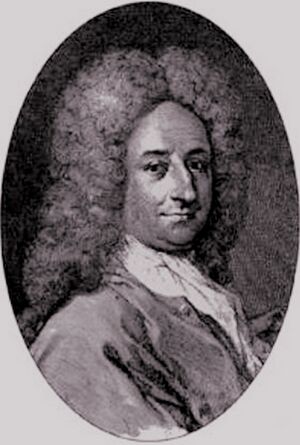Apostolo Zeno
Apostolo Zeno Apostolo Zeno (1668 in Venice – 11 November 1750 in Venice) was a Venetian poet, librettist, journalist, and man of letters.[1]
In 1691, he co-founded the Accademia degli Animosi, a literary society in Venice. In 1695, he wrote his first libretto, Gli inganni felici. It was a huge success and made way for many more to follow. From 1705 on, he professionally partnered with Pietro Pariati: Pariati composed the libretti while Zeno concentrated on the theatrical scenes. Zeno wrote more than 66 dramas and oratorios, 15 in collaboration with Pariati.[2] His libretti often center on historical and mythological themes.[3]
The Zeno family was an ancient noble family of Venice. Expelled from Venice to Candia (Crete) in the 13th century in order to maintain order and suppress any rebellious subjects, they were only able to return after the assault on the isle by the Ottoman Empire. However, they lost their patrician status.
The Treccani dictionary describes him as "a decent man of letters but not a true poet." Considering that Zeno was "Cesarian poet" in his time, it is fair to say that judgements may differ. However, it is clear that Zeno, at least regarding operatic libretti, is overshadowed today by Pietro Metastasio.
After brief invitations in the years before, Zeno was employed by the imperial court in Vienna from 1718 on, as "Poeta et Istorico Cesareo". He initially continued the collaboration with P. Pariati, also employed at the Viennese court, and which resulted in 15 opera texts, for which Z. mostly designed the plot structure and P. formulated the texts. In 1729 Zeno recommended Pietro Metastasio as his successor at the imperial court and returned to Venice to continue his earlier work as a writer and journalist.[4]
Apostolo Zeno in Philippe Jaroussky's discography, filmography and performance history
Studio albums
Complete list of musical pieces using Apostolo Zeno's libretti
This list only features Apostolo Zeno's contribution to Philippe Jaroussky's recordings.
| Year | Aria | from Work | Composer | Album, Concert program, etc. | Original first performance |
|---|---|---|---|---|---|
| 2010 | "Son io Fabio? ... Troppo è insoffribile fiero martir" | Lucio Papirio Dittatore (Antonio Caldara) | Antonio Caldara | Caldara in Vienna (Album) | 1719[5] |
| 2010 | "O mi rendi il bel ch'io spero" | Scipione nelle Spagne (Antonio Caldara) | Antonio Caldara | Caldara in Vienna (Album) | 1722[5] |
| 2010 | "Vado, o sposa" | Enone (Antonio Caldara) | Antonio Caldara | Caldara in Vienna (Album) | 1729[5] |
References
- ↑ "Apostolo Zeno". Wikipedia. Archived from the original on October 1, 2023. Retrieved October 1, 2023.
- ↑ "Zeno, Apostle". Treccani. Institute of the Italian Encyclopedia. Archived from the original on October 10, 2023. Retrieved October 10, 2023.
- ↑ "Apostolo Zeno". Wikiwand. Archived from the original on October 10, 2023. Retrieved October 10, 2023.
- ↑ "Zeno, Apostolo". Österreichisches Musiklexikon Online. Archived from the original on October 12, 2023. Retrieved October 12, 2023.
- ↑ 5.0 5.1 5.2 "Booklet Caldara in Vienna" (PDF). Idagio. Archived (PDF) from the original on October 1, 2023. Retrieved October 1, 2023.
External links
- "Zeno, Apostolo". Österreichisches Musiklexikon Online. Archived from the original on October 12, 2023. Retrieved October 12, 2023.
- "Booklet Caldara in Vienna" (PDF). Idagio. Archived (PDF) from the original on October 1, 2023. Retrieved October 1, 2023.
- "Apostolo Zeno". Wikipedia. Archived from the original on October 10, 2023. Retrieved October 10, 2023.
